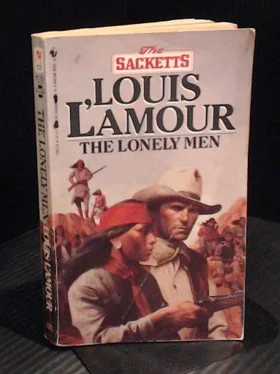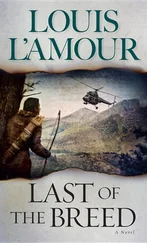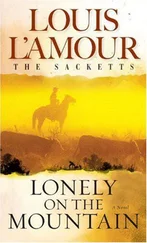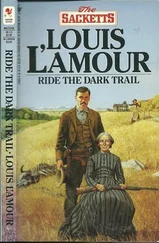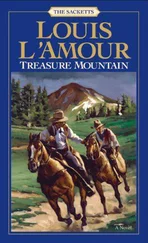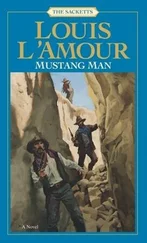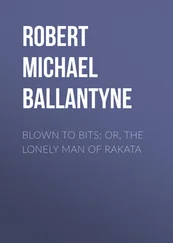Louis L'Amour - The Lonely Men
Здесь есть возможность читать онлайн «Louis L'Amour - The Lonely Men» весь текст электронной книги совершенно бесплатно (целиком полную версию без сокращений). В некоторых случаях можно слушать аудио, скачать через торрент в формате fb2 и присутствует краткое содержание. Жанр: Старинная литература, на английском языке. Описание произведения, (предисловие) а так же отзывы посетителей доступны на портале библиотеки ЛибКат.
- Название:The Lonely Men
- Автор:
- Жанр:
- Год:неизвестен
- ISBN:нет данных
- Рейтинг книги:4 / 5. Голосов: 1
-
Избранное:Добавить в избранное
- Отзывы:
-
Ваша оценка:
- 80
- 1
- 2
- 3
- 4
- 5
The Lonely Men: краткое содержание, описание и аннотация
Предлагаем к чтению аннотацию, описание, краткое содержание или предисловие (зависит от того, что написал сам автор книги «The Lonely Men»). Если вы не нашли необходимую информацию о книге — напишите в комментариях, мы постараемся отыскать её.
The Lonely Men — читать онлайн бесплатно полную книгу (весь текст) целиком
Ниже представлен текст книги, разбитый по страницам. Система сохранения места последней прочитанной страницы, позволяет с удобством читать онлайн бесплатно книгу «The Lonely Men», без необходимости каждый раз заново искать на чём Вы остановились. Поставьте закладку, и сможете в любой момент перейти на страницу, на которой закончили чтение.
Интервал:
Закладка:
At the top of a long slope we paused for a breather, and I looked around at Dorset. She was right behind me, leading her pony, and taking two steps to my one. Harry Brook, up there on the horse, had not said a word.
We stood there for a mite, and she said, "The sky's turning."
There was gray in it, all right, and day would come quickly now. We stood quiet then, saying nothing nor needing to, but there was communication in the night, we felt each other, felt the darkness and the danger around us, and felt the cool dampness of the canyon ,after the rain. We could smell the pines ... and we smelled something else.
We smelled smoke.
It was enough to curl your hair. In this layout we couldn't expect friends. My partners had lit out to the north, I was sure, and if there was anybody here it had to be Apaches. And that smoke was right ahead of us.
We daren't go back, and we couldn't climb out. Me, I slipped the Winchester out of its scabbard, and so did she.
"Well go ahead quiet," I whispered, "and if we can get by 'em, we will.
Otherwise, we got to mount up and run for it. You and the boy get on the same horse, and if trouble shows, run."
"What about you?"
Me, I smiled. "Lady, you're not looking at no hero. I'll get off a few shots and I'll be dusting the trail right behind you, so don't slow up or I'll run right up your shirt tail."
We started on. Dawn was streaking the sky when we saw the canyon was starting to widen out. Then I saw moccasin tracks, some shreds of bark, and a few sticks -- somebody collecting firewood. And then we heard yelling ahead of us, and I knew that kind of yelling.
"Might be," I said, "we can get by. They're mighty concerned, right now."
She looked at me. She said, "What concerns an Apache so much that we might slip by his camp?"
A man couldn't look into those honest gray eyes and lie. She would guess, anyway. "They got them a prisoner," I said, "and they're tryin' to find out how much of a man they caught. If he stands up to torture and dies well, they will figure they're big men, because they caught a big man."
We moved ahead, each of us warning our horse against noise, and those horses could be warned, they were that smart. Aside from their own instincts, they had caught some of our wariness for danger, for a horse, like a dog, can become extremely sensitive to the moods of his rider.
The western man trusted to his horse's ears, its eyes, its senses. He shared with it his water, and if need be, his food.
We moved forward quietly but steadily, and soon we saw their camp on a bench near the stream, partly hidden by brush and trees. The stream was not over four feet wide and no more than four or five inches deep, and the canyon through which we had come evidently caught the overflow.
Rifle ready, I led the way, watching the camp from the corner of my eye.
Here the dry stream-bed was perhaps fifty feet wide, most of it white sand dotted with rocks, many of them half buried. The brush was mostly willow, and thick.
It was a cool morning but I could feel sweat trickling down my back between my shoulder blades, and I worried for fear a hoof would strike stone. We went steadily on, drawing close to the camp, then abreast of it.
The Indians were almighty concerned with their prisoner, and they were shooting at him with arrows, missing in as close as they could, pinning the sides of his shirt to the tree, parting his hair with arrows. There was a trickle of blood down his forehead which I glimpsed when he lifted his head, and for the first time above their yells I heard his voice, and he was singing.
It was Spanish Murphy.
Yes, sir. Spanish was tied to a cottonwood in the clearing and the Apaches were shooting arrows at him and working themselves up to more serious ways of hurting ... and he was singing!
Oh, they hated him for it, but they loved him for it, too, if I knew Indians.
For their prisoner was a man with nerve, singing his defiance right into their faces ... and it was also a means of keeping up his courage.
They would kill him, all right. They were devils when it came to inflicting pain, and they would try to make him last as long as possible, devising new tricks to give him the tortures of hell, and loving him for his strength and his guts.
Spanish was a singing man who loved the sound of the old songs, the western songs, the songs from the high-up hills. He was singing "Zebra Dun" when we caught sight of him and, raising his head, he looked right through an open space in the brush, looked right at us, and he changed his tune to "John Hardy."
"John Hardy was a desperate man, he carried his two guns every day. He killed a man on the West Virginny line, but you ought to see Tell Sackett gettin' away, I want to see Tell Sackett gettin' away!"
There he was, a-warning me. Him in all that trouble, but thinking most of us getting out of there. And me, I daren't stop, for I had a girl and a small boy depending on me. But this I did see. There weren't more than inine or ten Indians there, so far as I could see, they were all warriors.
We went on, our skins crawling with fear for Spanish Murphy, and also with fear for ourselves. We were beyond their camp now, but were expecting any moment to hear a yell behind us and to see the Apaches come streaming after us.
The thing that played into our hand was that the Indians probably had no idea there was anybody else about. They had either killed the others, or they'd taken out running.
Fifty yards beyond their camp the canyon took a bend, and when we had it behind us we felt some better. I decided we didn't have much time before those 'Paches got down to serious business with Spanish. I knew I had to get him out of there, and I had to do it before he was hurt too bad to travel.
When we had gone a little way I pulled up. "You'll have to go on alone from here," I said to Dorset Binny. "Do you know Sonora?"
"No."
"The Apaches have run most of the folks off their ranches north of here, and the few who are still there won't fight back. I'd say ride due west and watch for a trail. If you can find a ranch, ask them to take you in and hide you."
She lingered, and I said, "Whatever made you try this, anyway?"
"There was nobody else to come. I didn't want my sister growing up an Apache."
She hesitated. "Not that what we had was so much better. Since Pa died I've been trying to ranch, but we haven't done very well."
"You ride west," I repeated. "I don't need to tell you to be careful. You didn't get this far riding it blind." I swung my horse, lifting a finger to my hatbrim.
" 'Bye, Dorset."
"Good-bye, William Tell," she said, and they rode away up the canyon and I turned back.
I had no idea in my mind at all about what I was going to do. How does a body go about taking a prisoner away from blood-hungry Apaches? I couldn't just open fire. In the first place, they'd scatter out, pin me down, and surround me in no time. Also, they might just up and kill Spanish right off.
All the time there was a-nagging at me a thing I knew about Indians. Ninety-nine times out of a hundred a man who rides into an Indian camp is safe as long as he stays there -- that is, if he rides in of his own notion, and not forced.
It was a long chance, for we were already shooting-enemies. They most likely knew me by sight by this time. Yet try as I might, I just couldn't come up with any other idea. But what to do when I got into their camp? How to get Spanish out of there?
I could get along in the language. Not that I was an easy talker like Tampico Rocca, but I could make out.
Spanish Murphy was in this fix because he had chosen to ride with me to Mexico, and it was up to me to take him from those Apaches, or to die with him.
I was packing plenty of iron. My Winchester was loaded, and I carried a six-shooter in my holster, with which I'd always been considered uncommonly swift There was another six-shooter tucked into my belt.
Читать дальшеИнтервал:
Закладка:
Похожие книги на «The Lonely Men»
Представляем Вашему вниманию похожие книги на «The Lonely Men» списком для выбора. Мы отобрали схожую по названию и смыслу литературу в надежде предоставить читателям больше вариантов отыскать новые, интересные, ещё непрочитанные произведения.
Обсуждение, отзывы о книге «The Lonely Men» и просто собственные мнения читателей. Оставьте ваши комментарии, напишите, что Вы думаете о произведении, его смысле или главных героях. Укажите что конкретно понравилось, а что нет, и почему Вы так считаете.
